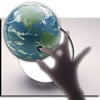A little girl once asked the Lubavitcher Rebbe if nuclear energy was good or bad. The Rebbe, in typically Jewish fashion, answered a question with a question: is a knife good or bad? The child said it depends— if you cut your food with it, it's good, but if you hurt someone with it, it's bad. So too with nuclear energy, said the Rebbe. It can provide safe, clean electricity for an entire city or destroy it entirely. It depends on how it's used.
Technology is ambivalent, neither good nor bad, but has the possibility to be either. And as the technology gets bigger and stronger, so does its impact. The biggest, most sophisticated, most powerful, and most popular tool in the world without doubt, is the internet. But what is the internet really? Is it the sum total of the billions of interlinked computers, iPhones, GPSs and what not?
The internet is lighter and mightier yet than the pen Not really. That's just millions of tons of hardware that upload, download and manipulate information to the internet. The internet itself is the information, but what does that mean, physically? Information is just ideas coded into language, and for computers, that language is made up exclusively of ones and zeroes. In "written" form, in the microcircuits, those ones and zeroes are flows of electrons.
In June 2007, a few brave souls at Discover Magazine got together to figure out exactly what the internet adds up to in material terms. They took the total number of "bytes" of information coursing through the net at any given time (40 million billion bytes), multiplied that by the number of electrons needed to store each byte (about 160,000 electrons), and then multiplied that by the mass of each electron (about one billionth of a billionth of a billionth of a gram).
And the result? The whole internet weighs 0.2 millionths of an ounce!
Of course the internet has grown in the meantime so let's say it's way up there by now to half a millionth of an ounce. It seems that just as the pen is lighter yet mightier than the sword, the information is lighter and mightier yet than the pen.
Imagine. A little nothing like that carrying all the transmitted information from over a billion computers and over 3 billion cell phones.
Amazing? Most definitely. Inspiring? Kind of. Because it depends on how that information is being used. Together with e-communal sharing of info, know-how, and good will to help solve the world's problems, the internet's capacity for inflicting damage to people, places and things is at least as great. As with the knife, it all depends on how you slice it.
The Rebbe, a master of worldly as well as other-worldly knowledge, explained Kabbalistic prophecies which alluded to science and technology as divine gifts that would emerge in tandem with Chassidic wisdom. Both together would empower us for tikkun olam, to improve the world in preparation for Moshiach and a world of good.1
To this end, science and technology serve three general purposes: (1) They provide useful analogies to better understand spiritual concepts; (2) they help us disseminate Torah and facilitate good deeds, and (3) they manifest divine principles in the physical world.
"We are headed toward a singular destiny: one vast computer composed of billions of chips and billions of brains, enveloping the planet (1) The internet is pretty much the repository and dispensary of all knowledge in the world. To quote science writer Kevin Kelley (in Discover July 2008), "We are headed toward a singular destiny: one vast computer composed of billions of chips and billions of brains, enveloping the planet in a single sphere of intelligence." Does this not give us an unprecedented analogue of unified omniscience? Of a great power, very real, yet not in essence, physical? The parallel to the Divine Being is further illumined by the Chassidic teaching that "what is Above is from you," the supernal realm is a reflection of what we "upload"—what goes around comes around.
(2) The internet certainly helps us disseminate Torah. It used to be that you had to travel to obtain a good book, to hear a good lecture, to do a good deed for someone in need. Not today. With a click of the mouse, you can download thousands of Judaica books including all the classics. You can find, hear and see your favorite speakers on your favorite subjects in your favorite language at any time of day and night. Even your mitzvot are web-enabled; you can Skype your mother, donate to charity or send a prayer to the Western Wall, all online.
(3) The internet is not only symbolic but actually exemplary of many Divine concepts: In addition to its near-omniscience and responsiveness as mentioned above, it is, like the Creator, an abstract reality. Nonetheless it's very real, to the extent that most people relate to virtual reality at least as much as to physical reality. And that's a good prelude to the coming day when "the earth will be filled with the knowledge of G‑d as waters cover the sea," may it take place immediately.







Join the Discussion